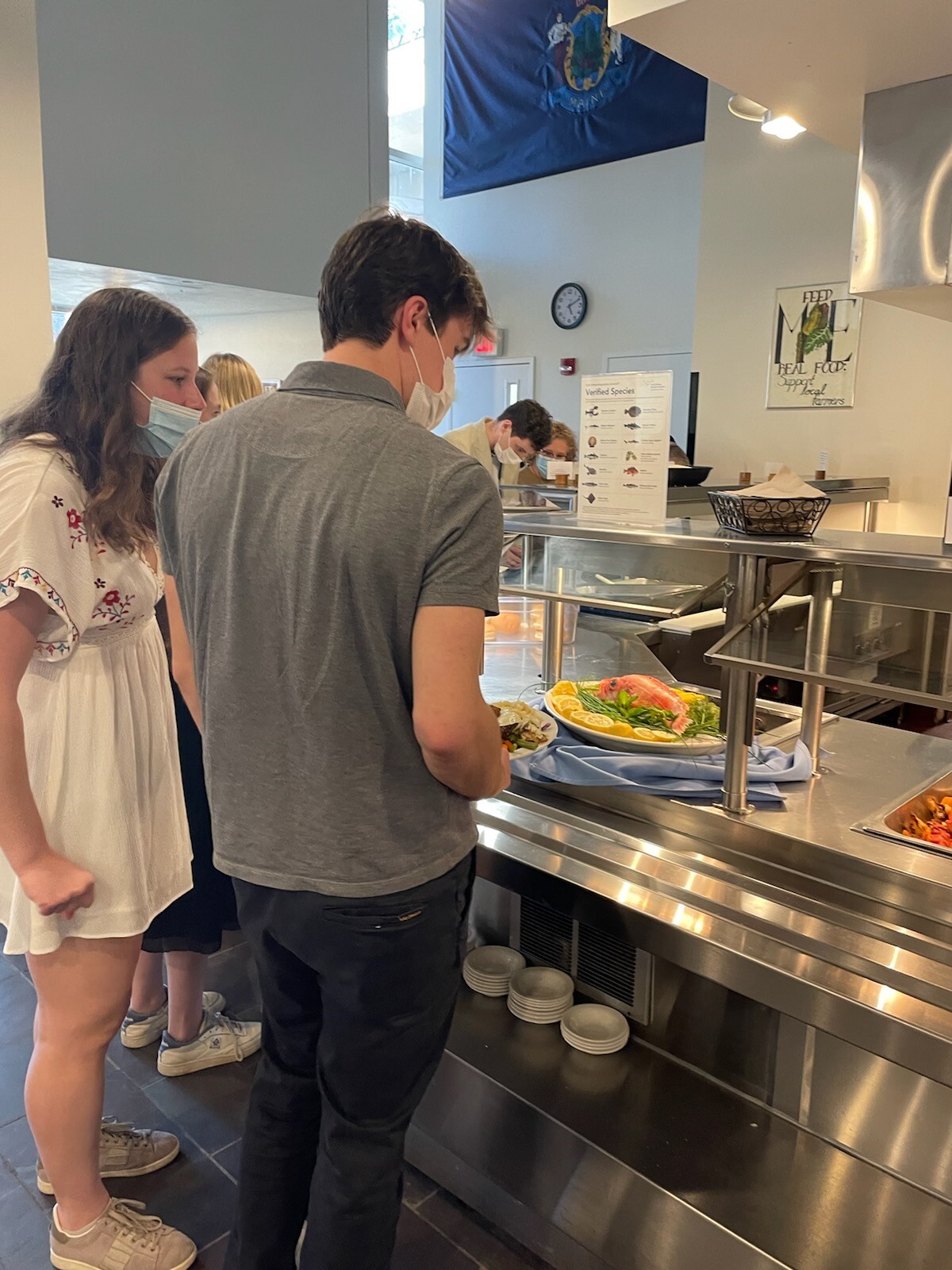Be Reel: students encourage local fish in dining halls
April 22, 2022
 Sophie Burchell
Sophie BurchellFor most students, consciously eating local food may mean having lunch at whichever dining hall is closest, and choosing a seafood option might start and end at the annual Lobster Bake. In an effort to increase consumption of local fish on campus, Dining Services has collaborated with two students to bring new fish options to the dining halls—and they hope to get students hooked.
Mattie Thomas ’22 and Alexis Mullen ’23 have led this effort as local seafood ambassadors of the Gulf of Maine Research Institute (GMRI) to campus. The pair has most recently reviewed the results of a survey they sent to the student body about their seafood preferences in March, and subsequently worked with Dining Services to incorporate student opinion into fish preparation and presentation. In addition to experimenting with more flavorful recipes, Dining Services has begun to post cards with information about sustainable catch certifications above the local fish options in the dining line that meet this standard.
“The students can see [the cards], and, given the results of our survey, hopefully take more seafood than they would [have],” Thomas said. “Being at school on the coast of Maine, there’s a lot of really fresh, local seafood that’s available to us, and students sometimes might not go out of their way to try that, but Dining does a great job of bringing that to the dining halls.”
The seafood ambassador program is run by the GMRI, a Portland-based nonprofit that supports marine ecosystem resiliency through fish stock assessments, education, community outreach and working with fishermen and their communities. Bowdoin has been a longtime partner of GMRI as part of the College’s efforts to become more conscious of its food sources, but this is the first year of this specific program.
Sophie Scott, a sustainable seafood project manager at GMRI, coordinates with the student ambassadors, who she sees as essential to changing student dining habits.
“Instead of GMRI coming in and being like, ‘Hey, Bowdoin students, why don’t you eat more local seafood,’ there is incredible power around students learning in a peer-to-peer way,” Scott said. “We wanted to learn how to encourage these students on the campuses that we work with to eat more local seafood, because it’s one thing for the universities that we work with to have local seafood on the menu; it’s another to try and get students to choose local seafood.”
The local seafood ambassador program is also running at Boston College, University of Maine at Presque Isle, University of New Hampshire and Southern Maine Community College. Scott expressed that GMRI wanted the program to be piloted at a range of schools with a range of student body populations and social climates and that Bowdoin was selected as the small, private New England school due to the College’s long-term partnership with GMRI.
“[GMRI] has always known that we’re interested in the same things that they are: sustainability and taking care of the Gulf of Maine,” Assistant Director of Menu, Sourcing and Human Resources Matthew Caiazzo said.
In addition to the changes in seafood labeling and recipes, Caiazzo, Mullen and Thomas coordinated with Dining to plan menus for the month of April. Each Friday this month, Moulton and Thorne Dining Halls have been serving a meal featuring fish caught in the Gulf of Maine. Entrees thus far have included “Baked Maine pollock florentine,” “Argentinian-style local fish” and “Baked Maine fish dijon.”
After April, Thomas and Mullen will survey students again about their April initiative and apply what they have learned to future dining hall menus. They also hope that the informational, sustainable catch cards will continue to be used by Dining and influence student preferences.
“[There are] a lot of buzzwords, but people hear ‘local’ and they get a little bit excited that the fish must be better—and it is, especially when it comes to seafood,” said Thomas. “Once it’s there, and it’s regular, people are going to be used to it and they’ll say, ‘Okay, well, there’s a local seafood card. I’ll take the fish option today.’”

Comments
Before submitting a comment, please review our comment policy. Some key points from the policy: